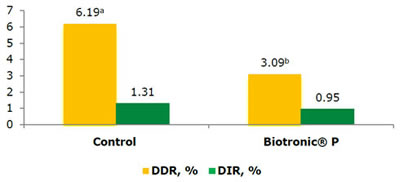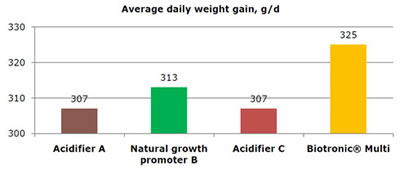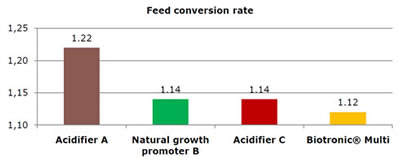Efficiency of Biotronic® Product Line in Pigs
Due to their strong antimicrobial effect, acidifiers assist in improving feed and water hygiene standards. BIOMIN GmbH provides Biotronic® acidifier line, a family of products, combined from selected blends of organic acids. The latest know-how technology enables BIOMIN GmbH to create the highly effective acidifier products and to assure their continual functionality through feed and water into animals' gastro-intestinal tract.
The effects of Biotronic® products were investigated in various scientific and field trials with pigs. These tests were carried out under different conditions following elaborate protocols. Supplementation with Biotronic® acidifier in weaning pigs improved on average feed conversion rates by 8%, average daily weight gain by 7.8% and decreased diarrhea rates by 57% in comparison to control groups. Under practical conditions in most of the trials the net return on investments (ROI) of Biotronic® acidifier products was higher than 1:8. Some of the trials which were carried out are highlighted below.
Post-weaning piglet trial with Biotronic® SE on commercial farm, Germany
The trial was conducted with 80 piglets (35 days old) which were fed either the control diet or the same diet with the supplemental Biotronic® SE (4 kg/t feed) during a period of 35 days. As shown in Table 1, feed intake (FI), average daily weight gain (ADG) and feed conversion rate (FCR) were improved by 2.8, 5.8 and 2.7%, respectively, in the trial group compared to the control group. Net return on investments (ROI) for Biotronic® SE was 1:8. The calculation is shown in Table 2.
Table 1. Piglet performance in response to Biotronic® SE
| Control | Biotronic® SE | Difference % | |
| No. of pigs | 40 | 40 | |
| Initial weight (kg) | 7.55 | 7.93 | |
| Final weight (kg) | 23.1 | 24.0 | + 3.9 |
| FI/ day (g) | 810 | 833 | + 2.8 |
| ADG (g) | 445 | 471 | + 5.8 |
| FCR | 1.82 | 1.77 | - 2.7 |
Table 2. ROI calculation for Biotronic® SE in pigs
| Item | Units | Control Group | Biotronic® SE 4kg/t |
| Final BW of pig | kg | 23.1 | 24.0 |
| Revenue per pig | € | 46.2 | 48.0 |
| Feed intake per pig | kg | 28.4 | 29.2 |
| Feed cost per pig | € | 9.6 | 10.1 |
| Cost of additive per pig | € | 0 | 0.16 |
| Revenue-feed cost per pig | € | 36.6 | 37.9 |
| ROI | 1:8 |
Post-weaning piglet trial with Biotronic® SE forte on commercial farm, Austria
The trial was conducted with 180 piglets which were fed either the control diet or the same diet with the supplemental Biotronic® SE forte (5 kg/t feed) during a period of 13 days. As shown in Table 3, ADG and FCR were improved by 13.4 and 3.2 %, respectively, and diarrhoea ratio decreased by 56.5% in the trial group compared to the control.
Table 3. Piglet performance in response to Biotronic® SE forte
| Control | Biotronic® SE forte | Difference % | |
| No. of pigs | 90 | 90 | |
| Initial weight (kg) | 7.21 | 7.25 | |
| Final weight (kg) | 9.84 | 10.23 | + 4.0 |
| ADG (g) | 202 | 229 | + 13.4 |
| FCR | 1.90 | 1.84 | - 3.2 |
| Diarrhoea ratio | 23 | 10 | - 56.5 |
Post-weaning piglet trial with Biotronic® P on commercial farm, Vietnam
The trial was conducted with 60 piglets (26 days old) which were fed either the control diet or the same diet with the supplemental Biotronic® P (3 kg/t) in a 28 day period. Biotronic® P supplementation improved the growth performance and FCR in weaning pigs (Table 4).
Table 4. Piglet performance in response to Biotronic® SE P
| Control | Biotronic® P | Difference % | |
| No. of pigs | 30 | 30 | |
| Initial weight (kg) | 8.00 | 8.03 | |
| Final weight (kg) | 13.94A | 15.25B | + 9.4 |
| FI (kg) | 10.50 | 10.60 | + 1.0 |
| Daily weight gain (g) | 212A | 258B | + 21.7 |
| FCR | 1.77A | 1.47B | - 16.9 |
| ROI | 1:21 |
Columns with different superscript differ significantly p < 0.01 respectively
Moreover, daily diarrhoea and daily illness ratio decreased by 50 and 69% in the trial group compared to the control group (Figure 1).

Figure 1: Daily diarrhoea ratio and daily illness ratio in piglets
+DDR: daily diarrhoea ratio (%) = total days of diarrhoea / total piglets (n) x trial time (d) x 100
† DIR: daily illness ratio (%) = total days of illness / total piglets (n) x trial time (d) x 100
Columns with different superscript differ significantly at p < 0.05
Post-weaning piglet trial with Biotronic® Multi on commercial farm, Australia
100 piglets (24 days old) were assigned to 4 different treatments: 1) acidifier A (3 kg/t feed), 2) natural growth promoter B (6 kg/t feed), 3) acidifier C (3 kg/t feed), 4) Biotronic® Multi (3 kg/t feed). The piglets were supplemented for 21 days. Due to Biotronic® Multi supplementation the growth performance was improved by 5.9%, compared to Acidifier A and C, and 3.8% compared to natural growth promoter B group (Figures 2 and 3) in weaning pigs. The FCR in Biotronic® Multi group was improved by 8.2% over Acidifier A, and 1.8% over Acidifier C and Natural growth promoter B.

Figure 2: Average daily weight gain in response to Biotronic® Multi

Figure 3: Feed conversion rate in response to Biotronic ® Multi
Post-weaning piglet trial with Biotronic® Gold on commercial pig farm, Austria
The trial was conducted with 78 piglets (28 days of age) which were fed either the control diet or the same diet with the supplemental Biotronic® Gold (5 kg/t feed) during a period of 13.5 days. The results of the present trial showed that supplementation with Biotronic® Gold improved FI, ADG and FCR by 3.2, 14.7 and 9.9%, respectively, compared to the control group (Table 5). Biotronic® Gold is a product consisting of organic and inorganic acids combined with medium chain triglycerides. The acid combination improves palatability and has a positive influence on the villi-length. Furthermore, the medium chain triglycerides deliver energy rapidly to the animal; therefore the animal performance is enhanced.
Table 5: Piglet performance in response to Biotronic® Gold
| Control | Biotronic® SE | Difference % | |
| No. of pigs | 39 | 39 | |
| Initial weight (kg) | 9.1 | 9.2 | |
| Final weight (kg) | 12.3 | 12.7 | + 3.3 |
| FI/ day (g) | 443 | 457 | + 3.2 |
| ADG (g) | 232 | 266 | + 14.7 |
| FCR | 1.91 | 1.72 | - 9.9 |
Return on investments
The return on investment (ROI) is a very important part of any investment review. Calculation of ROI is influenced by different factors and costs. Costs per unit and net returns in livestock production are highly dependent on production levels. Feed costs and prices per kg live weight (LW) or per head of weaned pig vary considerably across production levels and it is directly related to the local market pricing system. For example in some countries segregated early weaning (SEW) piglets have a very limited or non market niche. On these markets the ROI for weaning pigs might not be relevant, because 99% of weaned pigs will be fattened to 95 – 120 kg of LW and then offered to a market. Moreover, the calculation of ROI is highly dependent on variables costs such as cost of feed additives, morbidity and mortality rates, with them related veterinary service and medicine expenses, and fixed costs such as stables, equipment maintenance and labor. There is no common calculation of ROI, one can calculate the ROI relating to the carcass yield or net return on feed additive, or annual ROI, which shows the return in a certain time period, e.g. a week, 6 months or a year.
The calculation of net ROI for feed additive is related to three steps:
- Calculation of the amount of investment in feed additive
- Calculation of the revenue, associated with the investment
- Calculation of ROI dividing the revenue by the investment
Under practical conditions in most of the trials the net ROI of Biotronic® acidifier products was higher than 1:8, which means with every Euro invested for Biotronic® products the return is at least 8 times that amount.
Conclusion
The various scientific and field trials proved, that supplementation of Biotronic® line products either into animal feed or water, improves the animal growth performance and decreases the illness and mortality rates. The Biotronic® product line consists of products available in both powder and liquid forms for application in feed and water - ideal and practical solutions for prevention and control of pathogenic bacteria in swine.
For more information please visit www.biomin.net













 BIOMIN Holding GmbH
BIOMIN Holding GmbH +43 2782 803 0
+43 2782 803 0






